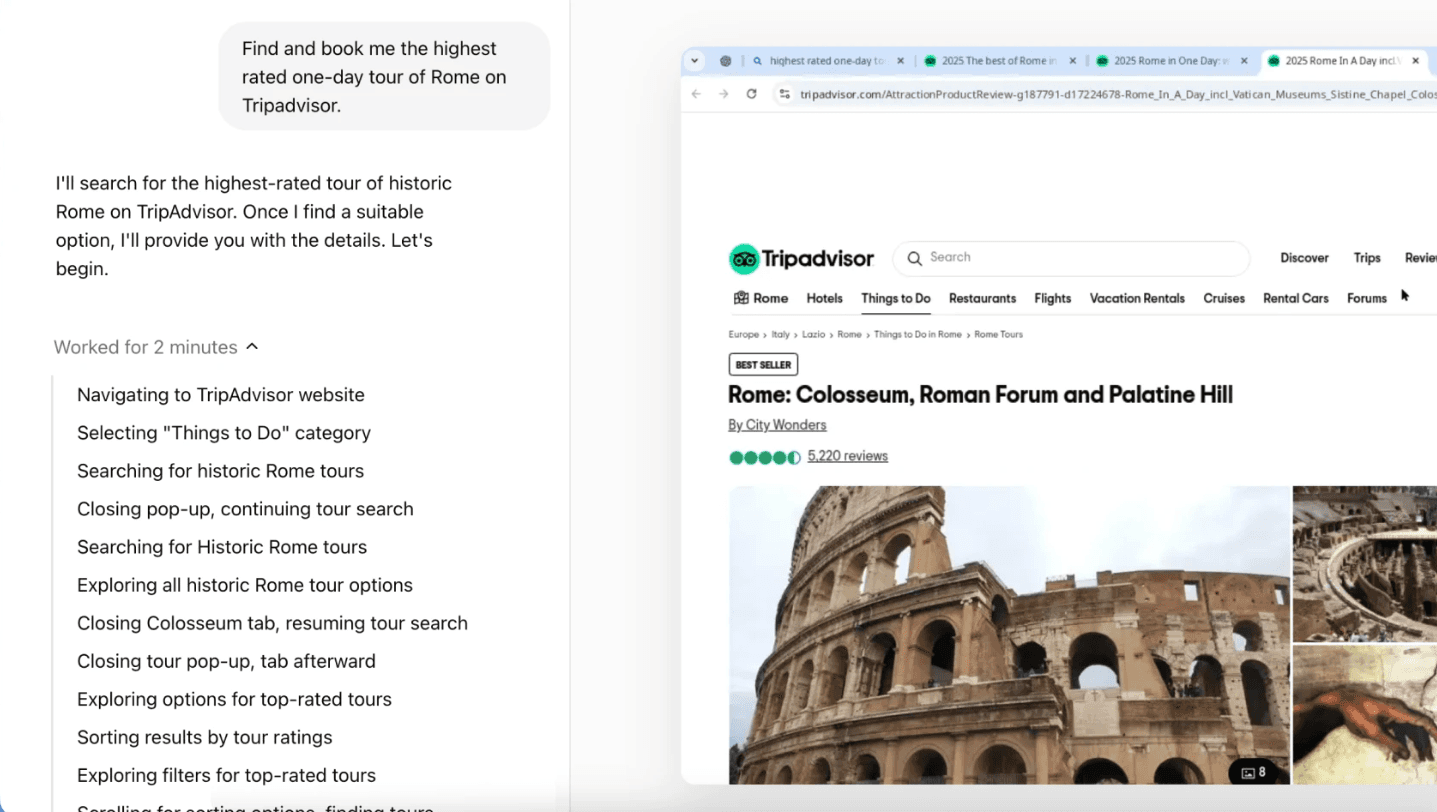AI Agents: How OpenAI’s Operator Simplifies Work and Maximizes Efficiency
Feb 10, 2025
Since ChatGPT’s release in 2022, OpenAI has been constantly pushing the boundaries of innovation, redefining how we interact with our devices.
OpenAI’s latest release, Operator, is an advanced AI agent designed to interact with websites and complete tasks for you.
It’s the beginning of a new era.
OpenAI’s Operator gives businesses the power to scale effortlessly and enables individuals to spend more time on meaningful, strategic actions rather than mundane, repetitive tasks. It saves time, reduces costs, and eliminates tedious manual work.
In this article, we explore what Operator is (read more about AI Operator, which is different from OpenAI’s Operator), how it works, why it’s important, and why using it will have major benefits for your business.
What is OpenAI’s Operator?
Operator is an AI Agent or AI Assistant that interacts with websites as if it were a human user. You send a prompt with instructions and watch it do everything in a built-in browser, with minimal input from you.
Is OpenAI’s Operator a Digital Assistant?
Not really. Operator acts as an AI Agent.
An AI agent is an advanced artificial intelligence system designed to perform tasks by itself by perceiving the virtual environment, processing information, making decisions, and taking action.
AI agents can adapt to new information, learn from their interactions, and respond dynamically to various tasks and situations.
Digital assistants rely on direct user inputs and pre-defined commands, meaning they act as a bridge between the user and another service rather than performing the task themselves.
While digital assistants like Siri, Alexa, and Google Assistant are designed to provide information and execute simple voice commands, an AI agent like Operator goes several steps further.
Operator doesn’t just provide answers—you give it a task and it’ll do it for you, taking everything to the next level.
What is a Computer-Using Agent (CUA)?
Operator leverages OpenAI’s GPT-4o model alongside a new framework called the Computer-Using Agent (CUA). The Computer-Using Agent (CUA) is an AI model designed to interact with computers and web-based interfaces in a way that mimics human behavior, navigating digital environments dynamically.
Operator understands, thinks, and takes action in real time, becoming a supportive force in improving the way humans work. It can:
Navigate websites, click buttons, and fill out online forms.
Book flights, hotels, and restaurant reservations.
Order products from e-commerce stores.
Research, compile, and summarize information.
Complete repetitive administrative tasks, such as automating bookkeeping tasks.
How Operator Works
At its core, Operator is powered by a sophisticated AI system that combines multiple technologies:
1. Autonomous Browsing
Operator interacts with web pages by understanding and interacting with on-screen elements, like buttons, menus, and input fields, that people can see. It can click, scroll, and input text without explicit code-based integrations. It can also recognize elements such as dropdown menus and checkboxes, as if it were a human user.
2. Reinforcement Learning
Operator improves over time by analyzing interactions and refining its ability to complete complex workflows efficiently. If challenges appear or it makes mistakes, Operator can use its reasoning capabilities to self-correct, like a truly adaptive and self-improving AI agent.
3. Security & Privacy Measures
Security is a primary concern for AI-driven progress. Operator is designed to give control to the user whenever needed, such as entering credit card details or logging in to websites. When the user does the actions, Operator cannot see the screen until it is given back control. It also logs interactions and follows strict data encryption protocols.

Operator preview of task and steps taken to finish. Source: OpenAI
Why OpenAI’s Operator Is Revolutionary
The launch of Operator marks a paradigm shift in how businesses and individuals approach digital tasks, whether in the workplace or daily life. Here’s why:
From Chatbots to AI Agents: Traditional AI tools assist users, but Operator acts on their behalf, bridging the gap between assistance and execution.
Hands-free Workflows: Employees no longer have to spend hours on repetitive tasks, allowing them to focus on strategic, long-term initiatives and more creative endeavors.
Saving Time and Money: By reducing workload and doing tasks quickly, Operator saves significant resources.
Scalability and Revenue Growth: Operator allows companies to handle a much higher volume of digital interactions, making it especially beneficial for industries with high operational demands. Increased efficiency means businesses can scale faster, ultimately leading to greater revenue.
Accessibility for Non-Technical Users: Operator is accessible to non-technical users, democratizing the global workforce. For example, an Executive Assistant may spend hours preparing a CEO’s trip and travel agenda; with Operator, you can delegate most tedious tasks but still oversee the execution and decision-making.
Increased Work-Life Balance: By handling tedious digital work, Operator frees up employees' time, allowing them to achieve a better work-life balance. This can lead to improved job satisfaction, mental well-being, and better performance at work.
The Benefits of Using OpenAI’s Operator
Resource Efficiency: Operator can do multiple tasks at the same time, reducing resources and time spent and freeing employees for higher-value work.
Cost Reduction: Reduces labor costs by eliminating the need for manual data entry and repetitive administrative tasks.
Accuracy: If properly managed, AI agents can perform tasks with accuracy and consistency. They apply the same rules and standards to every task, ensuring uniformity in outcomes.
Scalability: Handling multiple workflows simultaneously makes Operator ideal for SMBs and large enterprises, as well as founders who did not have a Personal Assistant before.
Enhanced Data Processing and Decision Making: AI agents can sift through and analyze vast amounts of data quickly, identifying patterns and insights that might be missed otherwise.
Innovation: Freeing up dreadful tasks opens new possibilities for creativity and problem-solving, paving the path to innovation.
Key Business Use Cases for Operator
1. E-Commerce & Retail
Making Purchases on Behalf of Users: Operator can order products from websites based on user instructions. OpenAI’s partnered with Etsy, Instacart, and other companies to expand reach and capabilities.
Price Monitoring & Competitor Analysis: Receive an in-depth review of multiple e-commerce platforms with pricing comparisons, helping you make informed decisions.
Finding and Recommending Products: Users can task Operator with searching for specific items, filtering options based on user preferences, and presenting the best choices available.
Filling Out Checkout Forms: Operator can streamline the online shopping process by quickly filling out address and payment information where applicable, making purchases more efficient.
2. Travel & Hospitality
Seamless Bookings: Operator can compare flights, hotels, and car rentals, and make reservations based on user preferences.
Automated Itinerary Planning: Receive AI-generated travel schedules, including bookings for tours, restaurant reservations, and car rentals, ensuring travelers have an end-to-end itinerary.
Guest Experience Optimization: Hotels and travel agencies can use Operator to personalize customer experiences, asking it to send messages or answer travel-related inquiries.
3. SaaS & Enterprise Automation
Subscription & Billing Management: Leverage Operator to renew, cancel, and modify software subscriptions, ensuring seamless account management.
Data Entry & Management: Operator can log, edit, and delete data.
Employee Onboarding: HR departments can task Operator to enroll employees in required training programs, set up software accounts, and distribute essential documentation.
4. Market Research
Competitor Analysis: Allow Operator to scan websites and gather insights on competitors’ pricing, product offerings, and marketing strategies.
Trend Identification: Businesses can use Operator to monitor industry trends and consumer sentiment by analyzing social media and news sources.
Data Aggregation: Operator can compile data from multiple sources into comprehensive reports, saving valuable time.
5. Professional Services
Scheduling & Contract Management: Operator can handle appointment bookings, rescheduling, and sending reminders.
Report & Proposal Generation: Ask Operator to draft customized reports based on client data, reducing manual document preparation and ensuring timely submissions.
Document Processing: Use Operator to auto-fill forms, gather necessary documentation, and file paperwork.
Conclusion: The Future of AI Agents
Operator is just the beginning of an AI agent that simplifies work, enhances productivity, and allows businesses to scale more efficiently. As AI agents continue to evolve, we are witnessing the birth of a future where business operations are transformed at every level.
If Operator is any indication, the next generation of AI will be more than just assistants—they will be intelligent, action-oriented digital workers, changing the way we interact with technology forever.











